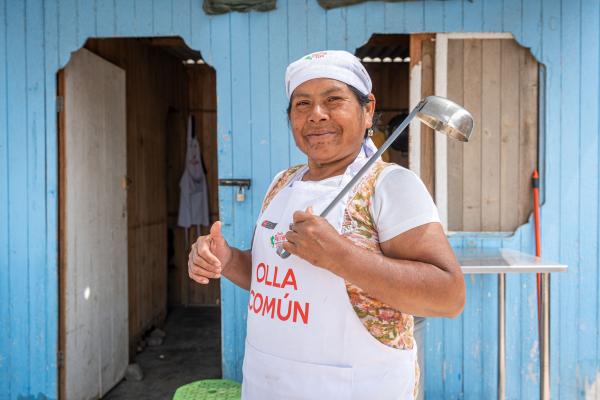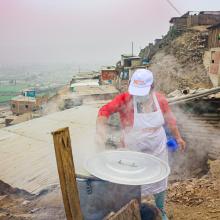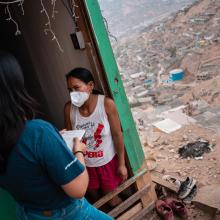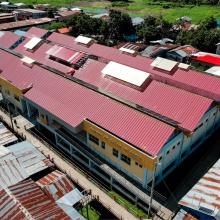Every morning, Sabina Cruz arrives at the Río Seco common farm with a clear mission: to help peel tubers, clean and cook the inputs that will feed more than 70 people in her community. She does this without expecting anything in return beyond securing her own plate for the day.
“I already have my food (secured),” she says with some relief.
In this high point of Carabayllo, a district located north of Lima, water is scarce, electricity is going out and gas is running out sooner than expected. However, the pot is still on, thanks to the organization of women like her.
As in 130 other common pots in the district, the menu in Rio Seco is sustained by self-management. Although they receive some basic foodstuffs from the state - rice, noodles, oil and menestras - they must raise funds by selling additional rations at three or three soles fifty to afford gas, water, vegetables and even napkins.
In these dining halls, meat is not eaten every day. A chicken leg can be divided into three dishes. The most common protein is menestras, and donated refrigerators sleep turned off because of the high cost of electricity.
Faced with this reality, Socios En Salud (SES), together with LG Peru, proposed an innovative solution adapted to the reality of the place: solar energy, safe water storage, efficient appliances and dignified spaces.
This project was winner in the LG Ambassador Challenge, and has already begun to be implemented in Río Seco, a town in Carabayllo, with a view to completing its installations in the second week of August. But beyond a technical installation, it is a commitment to sustainability, health and food dignity.
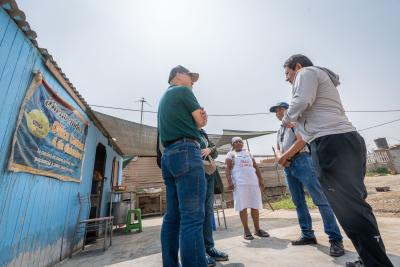
Los equipos de Socios En Salud y KFHI, organización aliada global de LG, se vienen reuniendo con las representantes de la olla común «4 de diciembre» para levantar necesidades del espacio.
Foto de Diego Diaz / SES
Common pots: the urgency that persists after the pandemic
During the toughest days of the COVID-19 pandemic, it was the common pots that kept thousands of families from going hungry. In Carabayllo, more than 130 of these community organizations - almost always led by women - fed their neighborhoods tirelessly, managing donations, cooking in the streets and facing mass unemployment without resources. Today, although the virus no longer dominates the headlines, the need is still there. The precariousness has not gone away.
Genaro Anco, head of the Social Protection Program (PPS) of Socios En Salud, knows this reality up close. “The common pots are self-managed, they don’t have capital like restaurants. They live from day to day. If you ask, they will tell you that they don’t eat meat like we do. The nutritional quality is very low, and the cost of water and gas hits them every day,” he says.
In addition to the lack of food, infrastructure problems are constant. Water does not come directly: it is deposited in low areas and is brought up in buckets or hoses with motors to the premises. Electricity is shared from a single meter for the entire neighborhood. The lack of adequate refrigeration causes many foods to go to waste, generating health risks, especially for children and the elderly.
Energy that feeds: the proposal of SES and LG
Against this scenario, the proposal of Socios En Salud was clear: it is not just a matter of donating equipment, but of transforming the way in which these cooking pots operate. To that end, they proposed an integrated solution that would reduce energy costs and improve food quality.
The project - dubbed “100 days of happiness” by LG - includes the installation of solar panels that will provide continuous and free energy to the common cooking pot. This will enable the efficient operation of a refrigerator with freezer, an industrial blender and other equipment needed to safely preserve and prepare food. New water tanks with greater capacity will also be installed and the infrastructure of the premises will be improved to provide a dignified space, with a roof and chairs, where families can eat.
“We had already tried to work on this issue before,” says Anco. “We got the donation of freezers, but they were not used because they were not adapted to the reality. Here, food is not bought by volume, but on a daily basis, and a freezer that turns everything it touches into ice doesn’t help. That’s why we now prioritize gradual refrigeration, with energy adapted to its context.”
A real commitment to sustainable change
For LG Peru, this type of partnership is not new, but essential. “This project is four years old in Peru, although LG Ambassador Challenge is carried out globally in countries in Africa, for example,” explains Laura Soplín, assistant manager of brand marketing at LG Peru. “This year we chose Socios En Salud because we saw that their proposal was sustainable over time and that the community was organized, with a president and clear functions. That guarantees that the change will last.”
Soplín stresses that the needs survey was key. “We saw that water does not arrive continuously, that better storage is needed. Also that electricity is limited and expensive. That’s why we included solar panels and adapted LG appliances. Our philosophy is that life is good, and we believe it can be good for the most vulnerable people as well.”
The project is currently in the implementation stage. Work has already begun on installing panels and improving infrastructure. For Carmen Rojas, a neighbor of Rio Seco, this means more than electricity or tanks: “I was hesitant before, but now I am happy. The lady who came explained everything to us and I feel that they are really helping us. She said that maybe we can have a bakery too. There is nowhere to buy bread here. It would be a great help.”
More than food: community, hope and future
Common pots are not just places to cook. They are centers of care, support networks, shelters in the face of a system that often fails to reach out. They are spaces where women like Sabina and Carmen not only distribute food, but also dignity. The LG and Socios En Salud project understands this well. They seek not only to alleviate a need, but to build solutions that are sustained over time.
Today, the common pot of Rio Seco is transformed. And with it, a new hope is kindled for many others in Carabayllo that may last longer than a hundred days.
